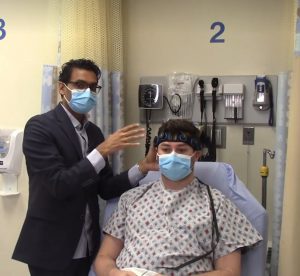 Jamaica Hospital Medical Center is the first hospital in Queens to utilize the most advanced technology to detect and diagnose seizure activity for critically ill patients to ensure they receive the most appropriate treatment as quickly as possible.
Jamaica Hospital Medical Center is the first hospital in Queens to utilize the most advanced technology to detect and diagnose seizure activity for critically ill patients to ensure they receive the most appropriate treatment as quickly as possible.
Millions of Americans live with seizures, which are defined as sudden, uncontrolled electrical disturbances in the brain. Seizures may occur after a stroke, a head injury, an infection such as meningitis, or another illness. They can take on many different forms and affect different people in different ways, and in some cases, may not generate any physical symptoms. Seizures can cause changes in behavior, movements or feelings, and in levels of consciousness. If untreated, seizures can have a lasting negative effect on brain function.
Traditionally, to detect and treat seizures, doctors need to rely on electroencephalography (or EEG) monitoring, which is not always readily available. Now, Jamaica Hospital can provide immediate detection of seizures through the application of the Ceribell Rapid Response EEG program. The Rapid EEG is the first of its kind and provides a vital sign of harmful brain patterns that do not produce observable signs in the patient and can only be diagnosed using EEG.
The Ceribell Rapid Response device is comprised of a simple headband with integrated electrodes, a pocket-sized recorder with intuitive software and an online portal for remote viewing. The system can be set up by a healthcare provider in a matter of minutes. Clinicians and nurses with no prior background in EEG can triage a seizure quickly and with a high rate of accuracy, and the technology’s remote capabilities allow a specialist to review the EEG data, assess response to treatment and optimize care, all in real-time, from nearly anywhere.
“This technology is now being offered in our Emergency Department and in our Intensive Care Units,” said Dr. Aashish Patel, Director of Neurology at Jamaica Hospital Medical Center. “Our entire team has been trained to use the Ceribell device and everyone marvels at its ease of use and diagnostic accuracy. This advancement will greatly benefit our most critically ill patients and help us provide immediate and appropriate care.”
All content of this newsletter is intended for general information purposes only and is not intended or implied to be a substitute for professional medical advice, diagnosis or treatment. Please consult a medical professional before adopting any of the suggestions on this page. You must never disregard professional medical advice or delay seeking medical treatment based upon any content of this newsletter. PROMPTLY CONSULT YOUR PHYSICIAN OR CALL 911 IF YOU BELIEVE YOU HAVE A MEDICAL EMERGENCY.
